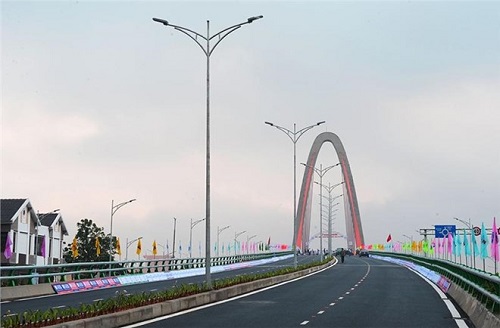Da Nang needs 51.7 million USD for traffic project
Da Nang is seeking a 51.74 million USD loan to fund the Traffic Infrastructure Improvement Project for 2016-19.
 |
| The Hue T-junction, one of the important traffic infrastructure projects in Da Nang that help ease traffic in the city's north part. (Source: VNA) |
The People’s Committee secretariat said the improvement of the busy intersection west of the Rong (Dragon) Bridge and the construction of a bridge and road system over the Co Co River was part of the project.
The project will ease traffic congestion and accidents in the city centre and boost connectivity with Hoi An City.
The bridge over the Co Co River and the road leading to it will cover a distance of 1.2km and result in a smooth traffic flow from the city to tourism hub Hoi An.
The city also plans to complete the construction of a 2.6km road on Tran Hung Dao Street and create a key traffic system on the Han River bank connecting the city’s North-South key roads.
There are also plans to build two road tunnels at some busy junctions and a tunnel through the Han River to ease traffic congestion, with a total investment of 172.88 million USD.
Da Nang has received funding from the World Bank for infrastructure development projects for the period 2008-19.
The World Bank had funded 70 percent of the project, with a total investment of 218.4 million USD in 2008-13.
The project had helped upgrade urban infrastructure, develop bridges and roads, and focus on issues related to resettlement areas, the environment, waste water treatment, staff training and city management.
In 2013, the World Bank agreed to undertake a major sustainable development project in the city with a total investment of 272.1 million USD, of which 202.4 million USD was donated by the World Bank. The project will add sewage drainage systems, Bus Rapid Transit (BRT) routes and resettlement areas, as well as two key urban roads and bridges to aid the city’s future development.
(Source: VNA)